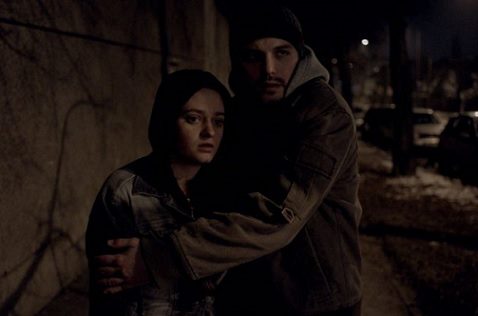The fate of a newborn baby is the central focus of the movingly melancholic drama Hatch, but the child essentially adopts the role of emotional McGuffin throughout a narrative that digs deeper in its adult exploration of responsibility. Eschewing sentimentality for a plaintive poignancy, writers Karl Goldblat and Christoph Kuschnig (who also directed) divide the conflict between two couples, a young immigrant pair who are coming to terms with the impossibility of raising a child with no means or money and a gay couple who have the money, but not the legal right.
When the child’s parents decide to deposit their baby in the titular hatch that represents the avenue of adoption, a young man lies in wait and then nabs the baby before a nurse can empty the hatch. Kidnapping a child sounds like pretty nefarious stuff, but there’s a sensitivity here that colors each action in human shades. Once the child is taken, we become privy to the plight of both couples, so blame fades away as we see a concise case made for either end of the ethical spectrum. An interesting dichotomy emerges between the two couples. One can’t afford the child, while the other clearly can, but in the end, neither can actually keep the baby.
This tragic inevitability invades every aspect of the movie, giving the themes an opportunity to dictate the picture’s visual identity. Crisply photographed in cold, gloomy hues, Hatch has a chilly look that reflects the Christmastime setting as much as it does the subject matter. And yet the imagery isn’t stale or repetitive. The scarce few locations offer a nice range of well-worn environments, from the clinical buzz of the baby hatch to the sparse, cramped apartment the newborn’s parents call home.
Each location is quickly and effectively defined, creating a unified vision of the different worlds our characters inhabit, boundaries crossed due to the presence of the child. The baby is literally trapped between these two worlds and it is how Goldblat and Kuschnig look at both sides sympathetically that makes for such an engaging experience. We end up pulled between these dual worlds as well, but instead of witnessing the two sides pitted against each other, we’re left to ruminate on the connective tissue that binds their specific dilemmas. It’s an impossible situation for both couples, leaving the child in limbo.
There’s a commentary on both the financial challenges of raising a child and the traditional biases of adoption agencies here, but it’s woven into the fabric of the narrative well enough that it doesn’t devolve into preachy message mongering. And for all of the movie’s turbulent emotions, Goldblat and Kuschnig winningly avoid sentimentalizing their themes. These are triumphant accomplishments, allowing Hatch to widen its scope while remaining focused on the two couples, each role performed so naturally that their aches become nearly tangible.
The moral fibers that connect the characters fascinate in their reverberations throughout the tight narrative. Early on, the child’s father steals a pack of diapers from a store and narrowly escapes on a bus as a store employee chases after him on foot, while later, the baby’s kidnapper runs off with the stolen child, narrowly escaping in his car as the father pursues on foot. It’s a lovely use of visual and thematic repetition to further align the experiences of the different characters and put them on equal moral ground. There are no heroes and villains here, such allegiances having been replaced with a sad sense of longing that cuts through distinctions of class and becomes, in context, universal.






'Movie Review: Hatch (2012)' has no comments